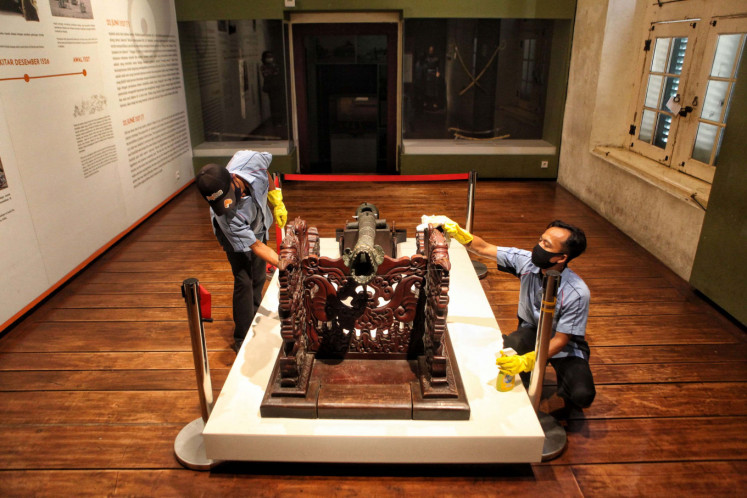Defamation and the threat to public accountability
The plight of Prita Mulyasari, a mother of two who is now facing court trial for defaming a hospital, has drawn sympathy and outrage from the public
Change text size
Gift Premium Articles
to Anyone

T
he plight of Prita Mulyasari, a mother of two who is now facing court trial for defaming a hospital, has drawn sympathy and outrage from the public. Her crime? Making a complaint on the quality of service she received from a provider.
Prita's personal email to her friends highlighted her disappointment at the hospital's quality of treatment and service. In response, Omni International Hospital in Tangerang filed a civil lawsuit on the grounds of defamation. The court sided with the hospital and ordered Prita to pay damages amounting to Rp 50 million and make a public apology. It doesn't stop there. Prita is now being charged for a crime of libel by the state.
The implication of these events runs deep; this is not just a standoff between a hospital and a patient. Prita's plight reflects the precarious position of service users in this country. But our concern as fellow citizens should not only be directed at the hospital in this particular case, but also at a bigger and more far-reaching institution: the judiciary. It may be the law that is ill-equipped, or judges that are lacking competency to properly interpret it, but the institution that is supposed to protect us has now become a big threat to us.
Like Prita, we are all service users. Perhaps more importantly, we are all public service users. We rely on the police to keep us safe and the military to protect us from threats. We rely on the public transportation services for mobility and the public works department for road maintenance. We rely on the parliament to produce good public policies and the courts of justice to solve our disputes.
We work hard and pay our taxes to finance these services and we deserve to receive them at least at the minimum standard of quality. We deserve to demand accountability from the service providers. And we deserve to be allowed to make complaints if they fail to deliver.
A true democracy would ensure the right of individuals to demand services they are entitled to, from the private sector or the government alike. This includes the right to file complaints, either directly with the service provider or publicly by any means. This is one of the most important incarnations of the freedom of speech, because it deters malpractice and corruption, and encourages better and higher quality services, and ensures accountability from all service providers, not least the government.
Of course, even the most democratic society acknowledges that freedom of speech is not without boundaries. Libel laws exist in every country around the world. But for a libel case to be valid, the prosecutor must prove motive, malicious intent and systematic actions to defame a person's name. It would be very difficult to imagine that Prita had any motive or malicious intent to defame the hospital; since she would have nothing to gain from it. Nor would it make sense to call sending a personal email to friends recounting a bad service received from a provider a "systematic action to defame," especially when one considers that she took no active role in spreading that email. No, Prita simply wished to make a legitimate complaint.
The court's ruling that Prita must pay severely for her complaint, sets a terrifying precedent for Indonesia. To an arguably lesser consequence, the court has opened the door for restaurants to sue their patrons who make it public that they got food poisoning from dining at the said establishments; for airlines to sue their passengers for publicly complaining that their baggage got lost every single time; or for credit card companies to sue their customers for publicly disclosing bogus charges.
To a more severe consequence, are we now liable to be sued under charges of defamation if we protest the low performance of the police department? Or if we cry out our disappointment with parliament members and highlight the rampant corruption within the institution? What now stops a local government from taking legal action using libel charges on citizens that lament about poor healthcare and low quality education in their region in a letter to the editor or on a blog?
The judicial system needs to do some introspection. The law is supposed to protect the weakest and most vulnerable members of society. In this case, the law should side with individuals - service users - who are at a significantly lower bargaining position than the big service providers and only have their voices as leverage. So far, the judicial system has done the exact opposite.
Prita was sued by the institution that was supposed to provide her with care and treatment and is now being sued by the state that is supposed to protect her, in a court that seems to have a perverse sense of justice. She's been taken away from her children for speaking up for herself and demanding the service that she deserved. Any of us could be next. Outraged? We should be furious.









